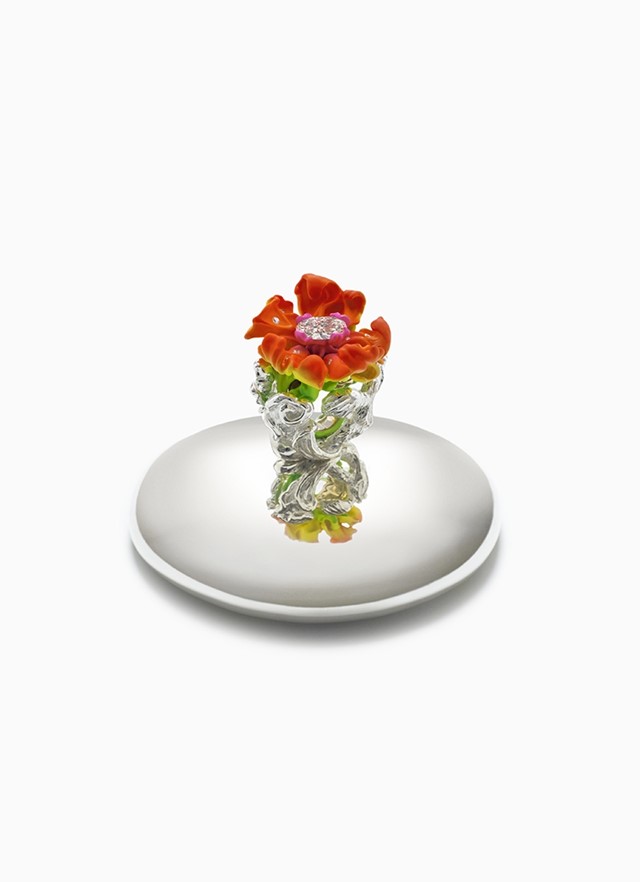Donatien Grau takes on prominent jewellery designer and creative director of Dior Joaillerie, Victoire de Castellane
Victoire de Castellane’s unique imaginative crafts and precise vision have granted her a prominent position in the world of jewellery, art, culture, and in the fashion sphere. After starting her career alongside Karl Lagerfeld, as chief designer for Chanel’s fantasy jewels, she was appointed to serve as creative director of Dior Joaillerie, a position which she has held until now. Her designs have equally been presented in art institutions around the world, and she is represented worldwide by the Gagosian Gallery, which featured her work in an exhibtion in its London gallery last month and will open another in New York on Madison Avenue in March.
How would you connect fashion to elegance?
I don’t know if these two words are meant to go together. Fashion does not necessarily have to be elegant. It needs to surprise us, to bring something new, to make a statement, but it also needs to be light, creative, to express and provoke desire. Elegance is different: it is something personal, a way of being, of existing in the world, a form of behaviour.
What is the role of history and art history in your conception of fashion?
If I think about history in relation to fashion, military clothes immediately come into my mind. There is nothing more beautiful than military clothes, and so many designers have been inspired by them. So maybe the connection between history and fashion ties in with the question of beauty. But actually I would tend to consider fashion as a form of light, visual enjoyment, which, from time to time, enters our lives. Fashion exists in the present: it is instantaneous. The very basis of fashion is that it very quickly becomes old-fashioned. Therefore, it may appear as the opposite of history.
Would you describe fashion as a language and a discourse, as Roland Barthes did?
It certainly is a way of communicating and, in that sense, a discourse. The way you are dressed relates to very important choices: it is an act of civilisation. There is something very moving in paying a great deal of attention to it, in dressing-up: it shows how much you care about other people, about the way they get to see you.
The word “intellectual” was coined at a time of great political distress. Does fashion have a political role? And in which way?
There are politics in fashion.
"Fashion is instantaneity; style is history"
How would you relate the concept of fashion to the one of style?
Fashion is instantaneity; style is history. Having style means entering history, dressing in an identifiable way, creating duration. It also means that you have been imposing a specific look, and that it will last forever. Fashion, as it relates to the desire to be appreciated by other people, ties into the need not to be excluded, to belong somewhere, to be part of a group. Style comes from the strength with which you accept not to be part of a group.
What does fashion have to do with intellectuality?
Since it is a language, a lot of thought is put in creating that language.
You have been working for leading fashion houses – Chanel and Dior. How do you engage with the DNA of these brands, while designing jewels?
They are like a family, of which I would be part and which I would observe, while working separately, on my side of the world. We work on totally different timings: I prepare jewels a year and a half in advance; they only have three months. I often play with the DNA of the house itself, while adding elements from my own creative identity. Sometimes, I even use parts of the DNA which may have been left a little bit aside in designing clothes for the brand. I work with identities, the one of the brand, and my own, I combine them. My goal is to eventually try to sublimate them.
How would you see the relation between fashion design and jewel design?
We are not that far, it is true. And yet, we work with different materials, and that changes a lot: I work with materials that force me to engage with the desire for eternity. You don’t do sales with jewels. I can’t just say: “I’ll do this, in two months people will have forgotten about it, and that’s fine” – something fashion designers are very aware of. People who acquire jewels need to feel that it is going to last, that it will stay for a long period time. It is not just something they buy, and then get bored of. Personally, I have always thought that jewels were going to stay after us – that they were our way to keep eternity.
In two weeks Donatien will interview the cultural theorist Esther Leslie.
